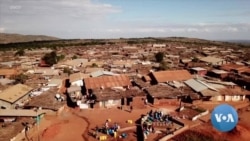The COVID-19 lockdown in South Africa, the country worst hit by the virus on the continent, is raising worries about children getting adequate nutrition. The malnutrition of children has long been a problem in South Africa, but measures to control the pandemic have cut off some of the vulnerable from government meals programs.
The coronavirus lockdown has disrupted a free meals program in South African schools for nine million poor children.
The absence of those meals puts a lot of families in a tough spot, says director of The Teddy Bear Clinic, Dr. Shaheda Omar.
"With children not being able to go to school, a lot of children have been deprived of having an opportunity of having access to food," she said. "During the lockdown period, what we have also found, that many people have not been able to secure an income, to generate any form of income, people both in the formal sector and informal sector, have suffered I think, enormously as a result of this."
The worst off are the children below school age, under age five, who in some cases suffer from severe malnutrition and stunted growth.
"Over 400,000 children in that age cohort category are not having access to food, so the food insecurity and if you just look at adequate nutrition and support of children, is definitely a grave situation, a situation that requires urgent attention."
Twenty-five years old and unemployed, Julia Moyo struggles to provide food for her five stepchildren.
She says as a family, they are facing a challenge to maintain the children at the moment, since the grandmother, who was the main breadwinner, recently passed away. The father of the children is now the single breadwinner, says Moyo, but he is also helping other family members who live nearby.
The United Nations’ World Food Program says between one fourth to one-third of South African children are stunted or too thin.
Gilbert Tshitaudzi is a nutrition specialist with the U.N. International Children's Fund in South Africa.
"Children are not consuming enough food with the right nutrients that are needed for their growth is the immediate cause of malnutrition in children," he said. "In infants and other children, it is due to poor infant feeding practices, where we find that most of the children are not breastfed. We need to remember that the greatest burden of all forms of malnutrition, is shouldered by children from the poorest and marginalized communities."
As the pandemic persists and more children go hungry and suffer from malnutrition, achieving the U.N.’s goal of “Zero Hunger” in the years to come is seriously in doubt.





